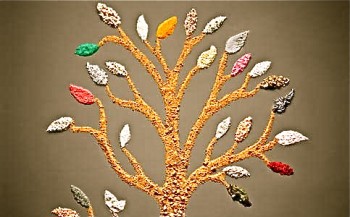Photo courtesy of niaid.nih.gov
VITAMIN B-12
For those who only consume plant foods ("vegans") or those who have a hard time absorbing B-12 (generally, the older we get, the harder it is), taking a B-12 supplement is highly recommended by many medical practitioners and health organizations. B-12 is one of many B vitamins, but it is the only one not provided in plant foods. It is made by a bacteria that lives in many places, including dirt and animal intestines. For animals, B-12 stores up in their bodies; hence, if you eat another animal's body, you consume B-12 too. Humans also have this special bacteria living inside us, but we don't get enough B-12 from them. Since plants tend to have the dirt washed off them, if you only eat plants you will not get adequate B-12. If you are not sure about your own B-12 status, you can get a blood test done at a doctor's office; ask specifically for them to check your B-12 level. If you believe you could benefit from supplementing it, B-12 supplements are easy to find and painless to take.
SUPPLEMENTATION: Part 1 of 7 SUPPLEMENTATION: Part 2 of 7 SUPPLEMENTATION: Part 3 of 7 SUPPLEMENTATION: Part 4 of 7 SUPPLEMENTATION: Part 5 of 7
For more on the Author, Sebastian Grubb, visit his ‘Movers’ page!

 VITAMIN D DETAILS
VITAMIN D DETAILS  The supplement industry is strong indeed, but few supplements actually confer health benefits. Two of the few that in many cases do are Vitamin D and Vitamin B-12, which I cover below. Nutrients work in relation with each other in order to be utilized within the body. Often nutrients are required in the right proportion in order to provide the necessary ingredients for the well-functioning of the body. The good news is that eating a variety (wider is generally better) of whole foods virtually guarantees that we get enough of what we need. This is because our bodies can, in most cases, selectively absorb varying amounts of different nutrients from the foods we consume. And the spectrum of whole foods available (at least in moderately- and very-wealthy countries) is brimming with a full array of essential nutrients. In short, the best scenario is that we get a lot of nutrients and specifically that we get them from food, not supplements.
The supplement industry is strong indeed, but few supplements actually confer health benefits. Two of the few that in many cases do are Vitamin D and Vitamin B-12, which I cover below. Nutrients work in relation with each other in order to be utilized within the body. Often nutrients are required in the right proportion in order to provide the necessary ingredients for the well-functioning of the body. The good news is that eating a variety (wider is generally better) of whole foods virtually guarantees that we get enough of what we need. This is because our bodies can, in most cases, selectively absorb varying amounts of different nutrients from the foods we consume. And the spectrum of whole foods available (at least in moderately- and very-wealthy countries) is brimming with a full array of essential nutrients. In short, the best scenario is that we get a lot of nutrients and specifically that we get them from food, not supplements.